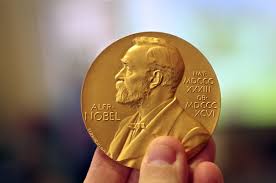Nobel Prizes in 2020

January 12, 2021
Each year, Nobel Prizes are awarded to individuals and innovations that improve mankind as a whole. Since its inception in 1901, 603 Nobel Prizes have been awarded for contributions that helped the greater good.
Nobel Prize in Chemistry: Last year, Emmanuelle Charpentier and Jennifer Doudna made history as the first all-female research team to win a Nobel Prize. They won it for the development of CRISPR-Cas9, a method of genome editing that allows scientists to rewrite DNA in any organism.
Nobel Prize in Physics: Roger Penrose, Reinhard Genzel, and Andrea Ghez were awarded this honor for their discoveries about black holes. Roger Penrose showed that black holes may be a direct consequence of Einstein’s theory of relativity. Penrose’s paper is widely regarded as the most significant contribution to the theory of relativity since Einstein. Andrea Ghez and Reinhard Genzel each led a group of astronomers focusing on a region called Sagittarius A, allowing orbits of the brightest stars closest to the Milky Way to be mapped with precision. Using their measurements, both of these groups found an extremely heavy object pulling on stars causing them to move at high speeds. This work is the most convincing evidence of a black hole at the center of the Milky Way.
Nobel Prize in Physiology or Medicine: Harvey Alter, Michael Houghton, and Charles Rice received the Nobel Prize for their discovery of the Hepatitis C virus which led to screening methods that drastically reduced the chances of getting hepatitis through the blood. Identifying Hepatitis C allowed scientists to study it and develop treatments that saved and improved the lives of millions of people.
Nobel Prize in Literature: This prize was awarded to Louise Glück “for her unmistakable poetic voice that with austere beauty makes individual existence universal.” Also a Pulitzer Prize winner, Louise has published thirteen collections of poetry in addition to volumes of essays on poetry. She has been acclaimed as one of the most prominent poets in American contemporary literature and has earned a glowing reputation.
Nobel Prize in Economic Sciences: The recipients of the Nobel Prize in Economic Sciences were Paul Milgrom and Robert Wilson. Milgrom, a professor of humanities and sciences at Stanford, was recognized for his analysis of how the format of an auction can improve expected revenue. He shared this prize with Robert B. Wilson whose work led to the theory of a common value, which is the estimate of what an item is worth. Together, Milgrom and Wilson created new auction formats to sell interrelated items more efficiently.
Nobel Peace Prize: This prize was given to World Food Programme for “its efforts to combat hunger, for its contribution to bettering conditions for peace in conflict-affected areas and for acting as a driving force in efforts to prevent the use of hunger as a weapon of war and conflict.” This program has fought hunger and famine since 1962. In response to COVID-19, they scaled their response to provide meals to 138 million people in 80 countries across the world.

